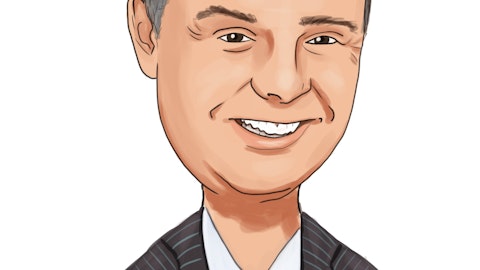Thomas Bell: I think fees would be consistent, maybe up a little bit. But if you look at what their fee income is, Ben, as Alberto mentioned, there’s some fee services, treasury management and wealth that would add to the fee income line. But if you look at their running rate on fee income, it would be probably consistent.
Ben Gerlinger: So this kind of what I was getting at here is like, yes, the balance sheet improvement makes sense. But when you think about just potential cross-selling, it’s clearly not going to happen in the first 60, 90, even in the first year of the combined entity. But when you think about just the fees outside of the normal kind of gains for that revenue, like the service fees, team interchange, wealth management. Do we see an inflection point on those sometime in ’24? Or is there hiring and staffing that’s needed as well? I was just kind of curious, just fee income growth in those areas, now that it includes Inland, it should have some cross-selling potential, but just trying to think about the bigger picture here.
Alberto Paracchini: I mean, I think, Ben, like we commented on, I think over time, there’ll be some opportunities there. But remember, we – this was a very traditional banking institution. They historically had had a mortgage business. That is not something that we opted to continue. So that’s not going to be part of the business going forward. Obviously, that was a source of fee income for them. It was also a source of expenses for them that will no longer be there. But aside from that, you’re taking – we’re consolidating a pretty traditional institution. So your sources of fee income are going to be service charges on deposits, some interchange revenue, et cetera. But there’s nothing really too exotic. We think we could probably do more business on the treasury management side because we have certain capabilities that they did not. But that will be normal course. So I don’t know that there’s anything extraordinary beyond that, Ben.
Ben Gerlinger: And then finally, the last one is obviously big picture. And I get that the ink just dried earlier this month on the deal, but your balance sheet is approaching 9. Is there any staffing or anything else that’s needed from a back office perspective to cross 10? It seems like 10, you have the potential to do organic because of a good growth engine or you could do a deal. Either way, you’re still going to need to hire some staff. Or is it already in place today?
Alberto Paracchini: Yes, there will be. We’ve always operated the company with the notion that we don’t kind of do things on a step function that, okay, we get to a certain point and then we need to hire to strengthen certain areas. We need to hire at that point. I think we’ve always built the company on the idea that the company will grow over time consistently. And we won, particularly on the risk management side, we want to stay ahead of what the regulatory expectations are of the company. So I think we’ve always built the company with that in mind. Do I think is – the question that you’re asking is, do I think we’re going to go through a period where we’re going to have to hire as we approach $10 billion in order to prepare to cross?
We’ll have to hire to a degree. But I think, I go back to my earlier comment, I think we have built gradually staffing, and we have built our risk and control functions pretty steadily over time. So we’ll have to do some hiring certainly as certain expectations. We have to meet higher expectations, but it’s not something where we haven’t built those functions, and we are starting from scratch, and now we have to run to accelerate in order to be prepared for that when the time comes. So hopefully, that gives you some perspective on that.


